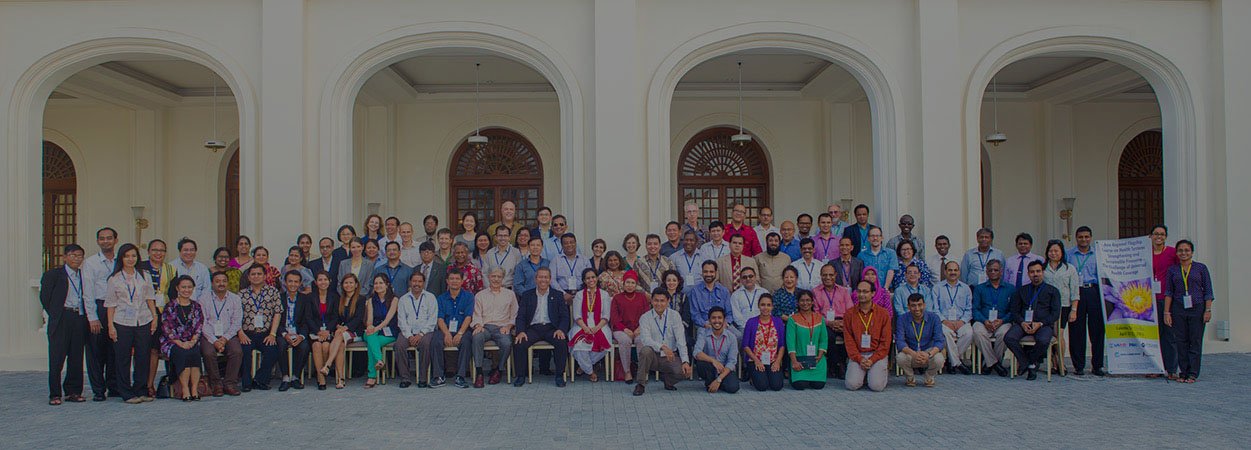
Overview
The health care systems in the Asia-Pacific region are heterogeneous. The countries span a wide spectrum of socioeconomic development, from less developed countries, to middle income countries, and higher income countries. Therefore the information and training needs of countries differ.
The Flagship Cluster aims to build and strengthen the capacity of policy-makers and researchers in the Asia-Pacific region/countries through the use of the Global Flagship Framework and Approach to analyze health system performance, and design health care reforms to achieve health system goals. Information draws on innovative health care reforms in the Asia-Pacific region, especially focusing on less-researched aspects of health systems such as organization and regulation, to inform policy makers and researchers.
Core Functions and Objectives
By the end of the course, participants are expected to:
- Explain the different aspects of UHC and the ways UHC relates to the performance goals of a health system.
- Systematically analyze the challenges, opportunities, and potential risks associated with using the five main policy levers (financing, payment, regulation, organization and persuasion) to move health systems towards UHC.
- Recognize the ethical and political economy issues involved in progressing towards UHC.
- Appreciate the importance of promoting health, preventing disease, and controlling costs to making progress towards UHC.
- Gain a clearer sense of the options, opportunities, constraints and priorities in considering the next steps towards UHC in their countries.
Questions regarding the application process for applicants receiving USAID and World Bank support can be sent to Sweta Saxena (ssaxena@usaid.gov) and Nedim Jaganjac (njaganjac@worldbank.org).
For an electronic version of the application form please contact Ruwanthi Elwalagedara at info@anhss.org. Potential sponsors are also welcome to contact ANHSS to discuss specific arrangements.
The Asia Network for Capacity Building in Health Systems Strengthening (ANHSS) is pleased to announce that the 2018 Asian Regional Flagship Course will take place in March in Sri Lanka. This course is a regionally adapted, week-long version of the regular Flagship Course, which is developed and taught by Harvard University and World Bank faculty for over 20 years. This course focuses on the challenges of achieving universal health coverage (UHC) in the Sustainable Development Goal (SDG)-era, with a focus on countries in the Asia region. This course applies the Flagship analytic framework to foster structured and strategic thinking about how to identify and address critical health system problems, and how to advance health systems towards UHC.
The course methodology uses a mix of lectures, debates, hands-on group work exercises and case studies. Daily group work sessions are a key part of the course and give participants the opportunity to apply the course concepts to their own countries, and to interact with and learn from the experiences of instructors and other participants/countries.
The focus of the course is on analysis, not advocacy. During five days of intensive interaction with peers and faculty, participants will learn how to apply tools and concepts to assess the status of their health systems relative to their coverage goals, understand the determinants of progress in health system performance, the levers that exist to improve systems and coverage, and feasible policy options.
The course is intended for mid-level and high-level policy-makers, managers, implementers and other stakeholders working in health and finance ministries and other government agencies, civil society and private sector organizations, and universities in the Asia-Pacific region, together with their development partners and other key stakeholders. Country teams comprising representatives from multiple agencies are particularly encouraged.

Asst. Prof. Chantal Herberholz

Prof. Eng Kiong Yeoh

Prof. Laksono Trisnantoro
Department of Health Policy and Management Faculty of Medicine
Universitas Gadjah Mada Indonesia
Professor Laksono is a Professor in Health Policy and Administration and a senior researcher at Faculty of Medicine Universitas Gadjah Mada Indonesia. His Ph.D is from London School of Hygiene and Tropical Medicine. In 2001 he spent his PostDoc year at Harvard Medical School, Department of Social Medicine, Boston. He is currently the Director of Graduate Program in Hospital Management Universitas Gadjah Mada and Chief Editor of Indonesian Journal of Health Policy.
His main interest is in health policy and administration, especially health service decentralization. He serves as consultant for Minister of Health and local government for many years. During the last 8 years, he is the director of various programs for supporting health services in remote areas as a collaboration between Universitas Gadjah Mada, local governments, and Ministry of Health. During Aceh and North Sumatera recovery after tsunami in 2004, Prof Laksono Trisnantoro directed a strong team for supporting health service for 4 years. Since 2010 he manages a consortium of hospitals and medical schools for supporting remote hospitals in Nusa Tenggara Timur province focusing in Maternal and Child health service. He spends part of his time as short-term consultant and technical adviser to a number of international agencies such as World Health Organization, AusAid, and the World Bank.

Malabika Sanker

Maria Elena B. Herrera
Asian Institute of Management
Manila, Philippines
Maya is an actuary, a management consultant, a teacher and a writer. She is core faculty of the Asian Institute of Management, Philippines. She is also Program Director of the Asian Institute of Management’s Strategic Finance, Finance for Senior Executives and Enterprise-Wide Risk Management Programs. Her fields of current study and research include: corporate strategy, enterprise risk management, corporate social responsibility, governance in family corporations, health policy and finance, entrepreneurship and innovation. Prof. Herrera has been in the training and consulting field since 1989. She provides technical advice as well as facilitation, training and executive coaching services. Her primary geographical areas of research, training and consulting are South East Asia, India and China.

Dr. Narjis Rizvi
Assistant Professor Department of Community
Health Sciences Aga Khan University
Karachi, Pakistan
Narjis is a public health researcher with over 25 years of experience of working in different parts of Pakistan. She is a physician by training and is a Fellow of the College of Physician and Surgeons, Pakistan. She specializes in the design, planning, implementation, monitoring and evaluation of community-based health systems projects.
As a faculty member in the department of Community Health Sciences (CHS), Aga Khan University, Pakistan, she is the focal person for undergraduate curriculum designing and implementation. She also teaches in the two masters programs of the CHS department namely Health Policy and Management and Epidemiology and Biostatistics. She has also worked at Health Services Academy (HSA), a federal public health institution of the Ministry of Health, Islamabad, Pakistan. While working at HSA, she taught graduate and post graduate public health students. She has provided technical oversight to a number of research studies that assessed and evaluated; Lady Health Worker’s performance, training curriculum of Community Midwives, maternal and child health programmes, youth awareness raising campaigns and Polio eradication.
Her literary work has been published in many international and national journals namely; Health Policy, Sexually Transmitted Infections, Injury Prevention, Biomed Central and many others. Her current research portfolio include; Co-Investigator, “Measles Immunization Coverage Survey in Sindh” funded by WHO; Co-Investigator, “Sukh”, a family planning project implemented in ten communities of Karachi funded by Aman, Bill Gates.

Nopphol Witvorapong
Faculty of Economics
Chulalongkorn UniversityBangkok, Thailand
Nopphol is an executive member of the Center for Health Economics (a WHO collaborating center for Health Economics) and the acting director of the Center for Alcohol Studies under the Thai Health Promotion Foundation. His current research interests include health insurance, intra-household relationships, health of the elderly, behavioral change and alcohol control policies. He has degrees in economics from the University of Oxford (UK), the University of Bath (UK) and the University of North Carolina at Chapel Hill (USA). Nopphol was a faculty member for the Asia Pacific Regional Flagship course in 2015 and 2016.

Ravi Rannan-Eliya
Director Institute of Health Policy Sri Lanka
Ravi is a Fellow and Executive Director of the Institute for Health Policy. He is a physician and economist with degrees in Political Science and Medicine from the University of Cambridge and doctoral training in Health Economics from Harvard University. In 1996, he established and developed the leading health economics research group in Sri Lanka, at the Institute of Policy Studies, before transforming it in 2005 into a full-fledged, independent research center, the Institute for Health Policy (IHP), which he now leads. He has undertaken research and consulted in more than 30 countries, working with the World Bank, WHO, ADB, and other agencies and governments.
He is recognized as a leading international expert in the areas of health equity research and health accounting. His current research focuses on issues of health systems financing, aging, equity, non-communicable disease and child under-nutrition. He is director of the IHP Research Hub of the Asia Pacific Observatory on Health Systems and Policy, co-director of the Global Network on Health Equity (GNHE), which brings together a number of regional health equity networks, and he coordinates two major scientific networks – APNHAN (Asia-Pacific National Health Accounts Network), and Equitap (Equity in Asia-Pacific Health Systems).

Prof. Siripen Supakankunti
Associate Professor Faculty of Economics
Chulalongkorn University Bangkok, Thailand